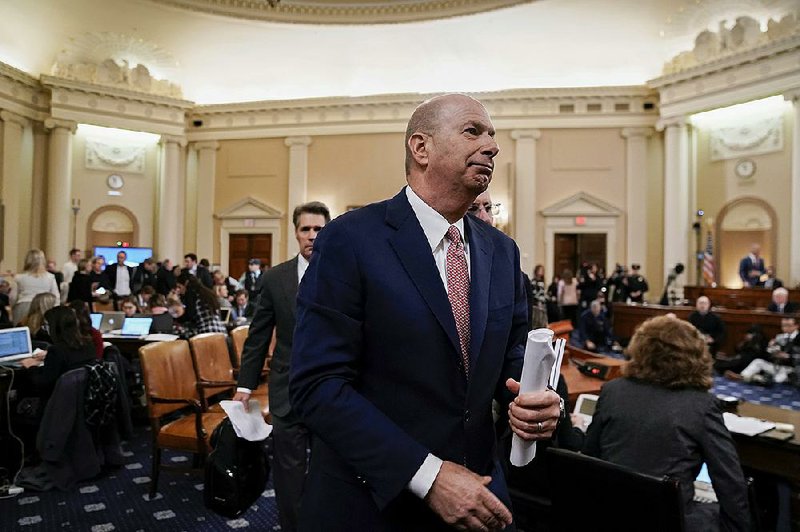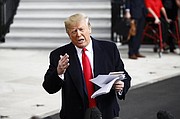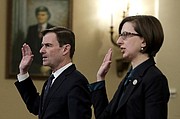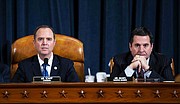WASHINGTON -- Ambassador Gordon Sondland testified Wednesday that President Donald Trump and his personal lawyer, Rudy Giuliani, sought to condition a White House invitation for Ukraine's new president to their demands that his country publicly open investigations that could damage Trump's political opponents.
"I know that members of this committee have frequently framed these complicated issues in the form of a simple question: Was there a 'quid pro quo?'" Sondland said in sworn testimony. "With regard to the requested White House call and White House meeting, the answer is yes."
Trump's U.S. ambassador to the European Union -- a longtime Republican donor who gave $1 million to the presidential inaugural committee and was confirmed by the Republican Senate -- gave the House Intelligence Committee an account of the president's culpability in leveraging the power of the Oval Office for his own political gain.
Sondland said he and senior administration officials "followed the president's orders" -- coordinating with Trump's personal attorney to pressure Ukraine to open investigations.
[Video not showing up above? Click here to watch » https://www.youtube.com/watch?v=XkuwdpXcAp4]
Later Wednesday, another witness undercut a main Republican argument -- that there could be no quid pro quo because Ukraine didn't realize the money was being held up. The Defense Department's Laura Cooper testified that Ukrainian officials started asking about it on July 25, which was the day of Trump's phone call with the country's new president when Trump first asked for "a favor."
Her staff received an email, Cooper said, from a Ukrainian Embassy contact asking "what was going on with Ukraine's security assistance." She said she could not say for sure that Ukraine was aware the aid was being withheld but "it's the recollection of my staff that they likely knew."
The testimony by Sondland provided perhaps the most dramatic moments yet in the impeachment inquiry. Trump had earlier this fall called Sondland "a really good man and great American."
In brief remarks to reporters outside the White House, Trump distanced himself from Sondland, saying, "This is not a man I know well." He noted that Sondland testified that the president had denied to him there was a quid pro quo.
"That means it's all over," Trump said.
But Democrats said Sondland's testimony pulled back the curtain on the extent of the Ukraine pressure campaign, implicating not just the president but Vice President Mike Pence, Secretary of State Mike Pompeo and acting chief of staff Mick Mulvaney.
"We now can see the veneer has been torn away," House Intelligence Committee Chairman Adam Schiff, D-Calif., told reporters during a break in the testimony, arguing that the situation as described by Sondland "goes right to the heart of the issue of bribery, as well as other potential high crimes or misdemeanors."
"I think a very important moment in the history of this inquiry," he added.
'EVERYONE IN LOOP'
Sondland said that Trump never told him directly the security assistance was blocked for the investigations, a gap in his account that Republicans and the White House seized on as evidence the president did nothing wrong. But the ambassador said his dealings with Giuliani, as well as administration officials, left him with the clear understanding of what was at stake.
Sondland identified Giuliani as Trump's conduit, saying he communicated the "topics important to the president." One of those was having Ukraine announce an investigation into a widely discredited conspiracy theory that the country was involved in peddling misinformation in the 2016 presidential election. Another was getting Ukraine to publicly announce an investigation into Burisma, a Ukrainian energy company where a board position had been held by the son of former Vice President Joe Biden.
Sondland said the work he and others carried out with Giuliani seeking a Ukrainian announcement of the investigations was done "at the express direction of the president of the United States."
He also said "there was no secret" about the work within a much larger circle of Trump's Cabinet.
[GALLERY: Gordon Sondland testifies in impeachment hearing » arkansasonline.com/1121hearing/]
Pompeo, Pence and Mulvaney were among those Sondland named as senior officials who were aware of the pressure campaign.
"Everyone was in the loop," Sondland said.
Sondland said that Pompeo was involved at several points. The secretary of state "was aware that a commitment to investigations was among the issues we were pursuing" and the State Department was "fully supportive," the ambassador testified.
That coordination with Pompeo extended to navigating what Sondland said he believed was another bargaining chip the White House had put in play in July to pressure Ukraine: $400 million in security assistance to fend off Russian aggression.
Sondland said that he was never privy to the White House meetings where the aid was frozen but that he became convinced that it was being held up as leverage and thought that was inappropriate.
Trump, Sondland testified, told him at one point there was "no quid pro quo" -- yet Sondland also said he understood there was a tit-for-tat arrangement and that it was directed by the president.
Rep. Scott Perry, R-Pa., blamed Sondland for the Ukraine controversy, accusing him of listening to the word of Giuliani over the president.
"He makes no attempt whatsoever to reconcile the differences," Perry said. "He just hangs up with the president after having been given very clear direction from the very person that he works for, and then assumes Giuliani's version of what's to be done is correct."
Perry added: "It's obvious the guy's not sure what the heck he thinks."
POLAND MEETING
The envoy said that he was concerned enough about the aid holdup that he sought to improvise a solution to that in August, before the larger question of whether Ukraine would start the investigations.
Sondland revealed an Aug. 22 email showing that he asked Pompeo to help him orchestrate a face-to-face encounter between Trump and Ukrainian President Volodymyr Zelenskiy, off to the side of a World War II commemoration ceremony that the two were scheduled to attend in Poland on Sept. 1.
Days later, Trump would decide not to travel to Warsaw and to instead stay in the United States as Hurricane Dorian threatened Florida.
Pence made the trip to Poland in place of Trump and, off to the side, Sondland held his own impromptu meeting with Zelenskiy confidant Andriy Yermak.
Sondland was more direct with his warning, he said in his testimony, telling Yermak that the resumption of U.S. aid "would likely not occur" until Ukraine took some kind of action on publicly committing to the investigations Trump sought.
Pence press secretary Katie Waldman said Pence was unaware of the "brief pull-aside conversation" that Sondland reported having with Yermak.
Pence also said Wednesday that he has no recollection of a conversation described by Sondland about a link between military aid for Ukraine and investigations sought by Trump.
Sondland testified Wednesday that he spoke with Pence before the Sept. 1 meeting with Ukrainian officials and told him he "had concerns that the delay in aid had become tied to the issue of investigations."
But Pence told a Wisconsin television station that the conversation doesn't ring a bell.
"I don't recall any discussions with Ambassador Sondland before my meeting with President Zelenskiy that had to do with investigations," Pence said.
A statement released by Marc Short, Pence's chief of staff, earlier Wednesday denied that Pence spoke to Sondland "about investigating the Bidens, Burisma, or the conditional release of financial aid to Ukraine based upon potential investigations," referring to the gas company where Joe Biden's son, Hunter, served on the board.
Short added that Sondland was "never alone" with Pence during the Sept. 1 trip to Poland.
"This alleged discussion recalled by Ambassador Sondland never happened," Short said.
Democrats pressed Sondland on the denial after the Pence statement was released, with Sondland saying he never indicated there was a one-on-one meeting with Pence.
CONTRADICTIONS
Sondland's account in his prepared remarks that there were conditions on the aid and that he relayed those to Ukrainian officials stands as a major reversal from private testimony he provided in the impeachment inquiry a month ago.
Sondland said "my memory has not been perfect," and stated that the State Department left him without access to emails, call records and other documents he needed in the inquiry.
Republicans called his account "the trifecta of unreliability."
During more than seven hours of questioning on Oct. 17, both Republicans and Democrats repeatedly asked Sondland whether aid was part of the White House quid pro quo. Numerous times, he said he could not recall.
After his denials were contradicted in testimony later provided by William Taylor, the acting U.S. ambassador to Ukraine, and Tim Morrison, the top Russia and Europe adviser on the National Security Council, Sondland filed a supplemental statement early this month, stating the testimony of Taylor and Morrison had "refreshed my recollection about conversations involving the suspension of U.S. aid."
Sondland's testimony contains many contradictions with Taylor, Morrison and David Holmes, an embassy official.
In one major discrepancy, Sondland had previously said he had only two calls with Trump between July and September. Morrison said he understood there were a half-dozen.
Holmes, a counselor in the U.S. Embassy in Ukraine, said he was present for one, which Sondland for the first time is now acknowledging.
In that call, placed July 26 from a restaurant in Kyiv, Holmes said he remembers Sondland using colorful language with the president to provide an encouraging update about Trump's sought-after investigations.
"I then heard President Trump ask, 'So, he's gonna do the investigation?' " Holmes testified, according to a transcript. "Ambassador Sondland replied that 'he's gonna do it,' adding that President Zelenskiy will do 'anything you ask him to.'"
At least three witnesses have said Sondland was speaking about a Biden investigation sought by Trump.
Sondland's reported use of the word Biden is the only element of Holmes' account that the ambassador says he cannot recall, according to his prepared remarks.
"It is true that the President speaks loudly at times ... . It is true that the President likes to use colorful language," Sondland said in his prepared remarks.
"The July 26 call did not strike me as significant at the time. Actually, I would have been more surprised if President Trump had not mentioned investigations, particularly given what we were hearing from Mr. Giuliani about the President's concerns," Sondland states.
But it wasn't about the Bidens, he adds.
"I have no recollection of discussing Vice President Biden or his son on that call or after the call ended."
Information for this article was contributed by Aaron C. Davis, Rachael Bade and Karoun Demirjian of The Washington Post; and by Lisa Mascaro, Mary Clare Jalonick, Eric Tucker, Colleen Long, Laurie Kellman, Zeke Miller, Matthew Daly, Andrew Taylor and Jill Colvin of The Associated Press.
A Section on 11/21/2019



